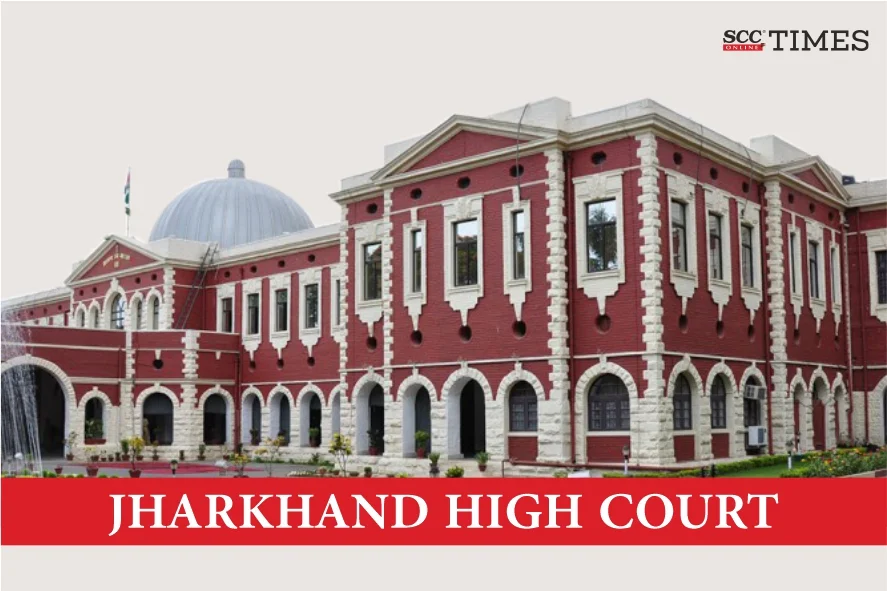Jharkhand High Court: Petition was filed by the petitioner to direct Respondent 2-Jharkhand Bijli Vitran Nigam Limited (‘JBVNL’) to issue TDS Certificate for Rs. 2,90,32,000 deducted as Income Tax at the rate of 2% from the bills raised by petitioner towards supply of materials. The Division Bench of Shree Chandrashekhar, ACJ.*, and Navneet Kumar, J., opined that the JBVNL had no authority in law to withhold Rs. 2,90,32,000 as “kept back” amount for the purpose of litigation with the Income Tax Department. Therefore, the Court held that the action of the JBVNL in withholding Rs. 2,90,32,000 was illegal and deprecated, and cost must be imposed upon it.
The Court further opined that any unjust retention of money or property of another should be against the fundamental principles of justice, equity and good conscience. Thus, the Court opined that petitioner was unnecessarily and knowingly dragged to the Court that there was no fault on petitioner’s part, and accordingly imposed the cost of Rs. 5 lakhs on the JBVNL, which should be recovered from the Managing Director.
Background
Petitioner was a firm registered under the Companies Act, 1956 and was engaged in the business of providing comprehensive engineering, procurement and construction services to the core sector industries in India. Petitioner was selected for the rural electrification works under Deen Dayal Upadhyaya Gram Jyoti Yojna. Later, the JBVNL issued the Letters of Award for supply of materials and for erection and civil works for Giridih, Bokaro and Dhanbad Districts. The JBVNL started deductions at the rate of 2% from the running bills raised by petitioner for the supply of materials and retained Rs. 2,90,32,000 on the pretext of “Income Tax Contingency”. Through several communications, petitioner requested the JBVNL to release the amount so withheld. However, the JBVNL did not release the illegally deducted amount, nor deposited the said amount with the Income Tax Department.
The JBVNL stated that it had made deductions at the rate of 2% from the running bill of the petitioner and the amount of Rs. 2,90,32,000 was “kept back” to safeguard its interest. The “kept back” amount should be released, or the TDS certificate would be issued depending on the outcome of the appeal preferred by the JBVNL against the demand notice dated 10-10-2017. JBVNL referred to the notice under section 201 of the Income Tax Act, 1961 and the demand notice that included the fine and a penal interest for the violation of the provisions for TDS deductions. The JBVNL had filed an appeal before CIT (Appeal) on 05-12-2017 against the demand notice.
Petitioner had challenged the action of the JBVNL in deducting Rs. 2,90,32,000 from the running account bills raised against the supply of materials. Petitioner submitted that, it was not party to the dispute between the JBVNL and the Income Tax Department, and the withholding of Rs. 2,90,32,000 without issuing the TDS certificate was arbitrary and unlawful. Petitioner made a categoric statement that it filed Income Tax Returns and paid all income tax liabilities and, that, the amount withheld by JBVNL should be over and more than its tax liability. Further, Income Tax Department stated that the JBVNL was the assessee in default, and they never instructed it to withhold/retain any TDS from the running bills of the petitioner.
Analysis, Law, and Decision
The Court opined that the demand notice issued to the JBVNL that it committed default in not making TDS deductions could not cloak the JBVNL, with any authority or even an excuse to withhold a certain amount from the running bills of the contractor. Further, it was relevant that the deductions by the JBVNL, starting from the financial year 2016-17 had accumulated to Rs. 2,90,32,000, but it did not deposit the said amount with the Income Tax Department. The amount withheld from the running bills of the petitioner was speculative and kind of a wagering step by the JBVNL. Thus, the Court opined that the JBVNL had no authority in law to withhold Rs. 2,90,32,000 as “kept back” amount for the purpose of litigation with the Income Tax Department. Therefore, the Court held that the action of the JBVNL in withholding Rs. 2,90,32,000 was illegal and deprecated, and cost must be imposed upon it.
The Court relied on Indian Council for Enviro-Legal Action v. Union of India, (2011) 8 SCC 161 and opined that any unjust retention of money or property of another should be against the fundamental principles of justice, equity and good conscience. The unauthorized deductions from the running bills of the petitioner were patently illegal, and such deductions caused losses to the petitioner, which filed its Income Tax returns but was deprived of Rs. 2,90,32,000 and thereby suffered business or at least interest losses.
The Court further opined that the imposition of cost on the party which started litigation without any just cause or took false and frivolous defences was necessary to discourage the dishonest litigant. To this end, the Court was required to impose such cost that would make the litigant think twice before putting up any speculative claim or defence. Thus, the Court opined that petitioner was unnecessarily and knowingly dragged to the Court that there was no fault on petitioner’s part, and accordingly imposed the cost of Rs. 5 lakhs on the JBVNL, which should be recovered from the Managing Director.
[Anvil Cables (P) Ltd. v. State of Jharkhand, 2024 SCC OnLine Jhar 1149, decided on 08-04-2024]
*Judgment authored by- Acting Chief Justice Shree Chandrashekhar
Advocates who appeared in this case :
For the Petitioner: M.S. Mittal, Senior Advocate; Rahul Lamba, Advocate; Salona Mittal, Advocate;
For the Respondents: Rajiv Ranjan, Advocate General; Sachin Kumar, Senior Standing Counsel; Anurag Vijay, Standing Counsel; Om Prakash, AC to Standing Counsel; Shivam Singh, AC to Standing Counsel.






